When thinking of Ethiopia, one might imagine its rich cultural heritage or the ancient rock-hewn churches of Lalibela. However, for many Ethiopians, daily life revolves around their jobs and the labor they contribute to their thriving nation.
Agriculture reigns supreme in Ethiopia. For centuries, farming and livestock rearing have been the backbone of the country’s economy. With approximately 70% of its workforce engaged in agriculture, it's the most common job, providing food and income for millions. Ethiopians cultivate crops like teff, a staple grain, along with coffee, which is one of Ethiopia's leading exports.
- The Agricultural Backbone
- Other Prominent Sectors
- Working Conditions in Ethiopia
- Economic and Social Impact
The Agricultural Backbone
When discussing employment in Ethiopia, one cannot overlook the overwhelming prevalence of agriculture as the nation's most common job. With roughly 70% of Ethiopians working in agriculture, it is an industry that not only supports individual livelihoods but also forms the backbone of the country's economy. This sector is vital in providing food security and generating revenue through the export of various crops.
The country's landscape and climate favor diverse agricultural activities. Various regions specialize in different crops, from teff, a diminutive grain akin to quinoa, to the world-renowned Ethiopian coffee. In the verdant highlands, farmers cultivate teff as a staple, transforming it into injera, a sourdough flatbread that is central to Ethiopian cuisine. This grain is not just nutritionally rich but also drought-resistant, making it ideal for Ethiopia’s challenging weather patterns.
"Agriculture has historically been and continues to be the backbone of Ethiopia's economy," says Dr. Arega Yirdaw, an acclaimed Ethiopian economist. "The sector not only ensures food security but significantly contributes to our GDP and employment."
Coffee, referred to as 'black gold,' is another massive player in Ethiopia's agricultural scene. The country is often credited as the birthplace of coffee, and today, it remains one of Ethiopia’s most crucial export commodities. Ethiopian coffee beans, prized for their unique floral and fruity notes, find their way into coffee cups around the globe. Regions like Sidamo, Yirgacheffe, and Harrar are celebrated for their high-quality coffee beans. It’s fascinating to note that more than 15 million Ethiopians rely on coffee farming for their daily bread.
Beyond these primary crops, Ethiopia also grows a variety of fruits, vegetables, spices, and pulses. Livestock farming is quite common, adding another layer of complexity and productivity to the agricultural sector. Sheep, goats, cattle, and camels roam the Ethiopian plains, providing meat, milk, hides, and even traction power for plowing fields. This multifaceted approach to agriculture allows communities to be somewhat self-sufficient, relying on both crops and livestock.
The Ethiopian government recognizes the critical role of agriculture and has thus invested significantly in the sector. Numerous programs focusing on modernizing farming methods, improving irrigation systems, and extending access to markets have been rolled out. Extension services help farmers adopt better practices, aiming to increase productivity and income. From expanding network roads to improve transportation of goods, to initiatives supporting female farmers, the holistic approach is yielding promising results.
However, challenges remain. Climate change poses significant risks through erratic rainfall and prolonged droughts. Soil degradation from over-farming and limited access to modern agricultural technologies also impedes progress. Despite these hurdles, the resilience and hard work of Ethiopian farmers stand as a testament to the country’s enduring agricultural heritage.
In summarizing the agricultural landscape of Ethiopia, it's clear that the sector is a multifaceted powerhouse. It bolsters the economy, sustains millions of livelihoods, and plays an essential role in defining the nation’s identity. The deep connection Ethiopians have with their land and produce cannot be overstated, and it bodes well for the future of agriculture in this vibrant nation.

Other Prominent Sectors
Apart from agriculture, Ethiopia has several other sectors that play crucial roles in its economy and workforce. Manufacturing, for instance, has seen substantial growth over the past decade. Factories producing textiles, leather goods, and processed foods are increasingly common around the country. The government’s industrialization strategy has significantly boosted employment in these areas, providing jobs to thousands of Ethiopians and helping to diversify the nation's economy.
Construction is another booming field. With rapid urbanization and increasing infrastructure projects, the demand for construction workers has skyrocketed. Whether it's building new roads, schools, or residential areas, laborers, engineers, and architects are in high demand. This sector not only provides employment opportunities but also contributes to the improvement of living standards and economic growth.
The service industry, though smaller compared to agriculture and manufacturing, is steadily growing. It encompasses a broad range of jobs, from retail and hospitality to IT and education. Ethiopia's capital, Addis Ababa, is a hub for services, where businesses and educational institutions thrive. This sector's development has facilitated the growth of middle-class employment, offering more diverse job opportunities to young professionals.
Mining is a notable sector as well. Ethiopia is rich in mineral resources, and mining has become a significant part of the economy. Gold, tantalum, and potash are among the primary minerals being extracted. This industry not only provides jobs but also attracts international investments, which is crucial for the country's economic expansion.
In recent years, the tourism industry has also started to flourish. With historical sites, natural parks, and a rich cultural heritage, Ethiopia is attracting more tourists each year. This influx boosts the hospitality sector, including hotels, restaurants, and tour operations, creating numerous job opportunities across the country.
"The service sector in Ethiopia is a beacon of hope for many young graduates looking to start their careers, offering a range of opportunities from hospitality to information technology." - Addis Fortune
Altogether, these sectors paint a diverse picture of Ethiopia's employment landscape. They highlight the economy's progress and the multitude of opportunities available to its people. As more sectors emerge and grow, the demand for a skilled and versatile workforce will continue to rise, promising a resilient and dynamic future for Ethiopia.

Working Conditions in Ethiopia
For most Ethiopians, work is a fundamental and daily part of their lives. The sheer diversity in types of work available, particularly in the agricultural sector where over 70% of the workforce is engaged, makes Ethiopia a compelling case for studying working conditions. It’s important to understand that while farming provides livelihoods for many, it isn’t without its challenges. Most agricultural workers toil under challenging environments, often experiencing long hours and physically demanding tasks.
One of the defining features of these jobs is the reliance on traditional farming methods. Many farmers still use oxen for plowing fields and perform manual labor when sowing and harvesting crops. This lack of mechanization can lead to inefficiencies and makes the work exceedingly labor-intensive. This, paired with unpredictable weather patterns, can greatly affect the productivity and incomes of farming households.
Conditions in urban centers, however, diverge significantly. In cities like Addis Ababa, you’ll find a growing number of people employed in the service and manufacturing industries. While these sectors do offer more diversity in job opportunities, they also feature their own set of hurdles. For instance, workers in manufacturing often grapple with low wages and poor working environments. In some factories, employees face long hours with minimal safety measures in place.
It’s also worth noting the gender disparities in the workforce. Men and women experience different working conditions and opportunities that heavily tilt against women. Women are often engaged in informal employment, such as street vending and domestic work, which lacks social security and other worker protections. A significant percentage of women in Ethiopia are also involved in unpaid labor, primarily within family farming establishments.
To gain a more nuanced understanding, one might consider the words of Dr. Mulu Nega, a well-known labor economist:
“The working conditions in Ethiopia are a double-edged sword. While work is abundant, the quality and safety of those jobs are often wanting. This calls for more structured reforms to uplift the standards of employment across sectors.”Efforts are underway, though, to change some of these circumstances. Organizations, both local and international, are working to introduce more sustainable farming methods and improve access to modern agricultural technologies. These efforts aim to not only boost productivity but also make agricultural work less strenuous.
Moreover, government initiatives have been targeting skill development to provide young Ethiopians with the tools they need to thrive in various jobs. These include technical training programs and vocational courses designed to better align the workforce with current market demands, thereby reducing the pressure on the agricultural sector.
Despite these efforts, there is still a long way to go. Addressing issues like worker safety, fair wages, and gender equality will require a sustained and multi-faceted approach. As Ethiopia continues to grow, understanding and improving working conditions remains a crucial aspect of its development journey.

Economic and Social Impact
Ethiopia's dependence on agriculture does more than just fill stomachs; it strongly influences the country's economic health and social structure. With millions of people working in this sector, the ripple effects are substantial. This robust engagement in farming is vital not only to feed the country's population but also to sustain its export economy. Coffee, known as 'black gold' in Ethiopia, stands out as one of the country's top exports alongside sesame seeds and khat, a leaf chewed as a stimulant.
A **strong agricultural base** can stabilize the national economy and help alleviate poverty. The income generated from farming supports families, provides education for children, and funds other essential needs. The Ethiopian government has various initiatives aimed at improving agricultural productivity, ensuring that farmers have access to resources like fertilizers and high-quality seeds. Consequently, it enhances food security, making it less likely for families to face hunger during lean seasons.
It's interesting to note the social fabric tied to agricultural work. In rural Ethiopia, where farming is prevalent, communities tend to be closely knit. They rely on collective effort not only for farming activities but also for social and cultural gatherings. This communal lifestyle reinforces social bonds and establishes a sense of mutual reliance that is often absent in urban settings.
"Agriculture is the best weapon to fight against poverty and unemployment. By investing in this sector, we create opportunities that ripple through every community," says Abiy Ahmed, Ethiopia's Prime Minister.
Another significant impact of this sector is gender equality. Traditionally, men have dominated farming; however, women are entering the workforce in increasing numbers. Many women are taking up roles not just in the fields but in decision-making capacities and administrative functions related to agricultural cooperatives. Empowering women in this sector has multiple benefits, including improved household welfare and better educational outcomes for children.
Even though agriculture is the predominant occupation, the Ethiopian government is also focusing on diversifying its economy. Investments in manufacturing, services, and technology sectors are gradually shifting some workforce away from traditional farming. Industrial parks, like the Hawassa Industrial Park, are creating new jobs and attracting investments. This diversification aims to balance the economy and mitigate risks associated with reliance on a single sector.
The economic and social impact of common jobs in Ethiopia is a testament to the interconnectedness of employment, economic health, and community well-being. By recognizing and supporting the primary sectors that employ the majority of its population, Ethiopia paves the way for sustainable development and a brighter future for its citizens.
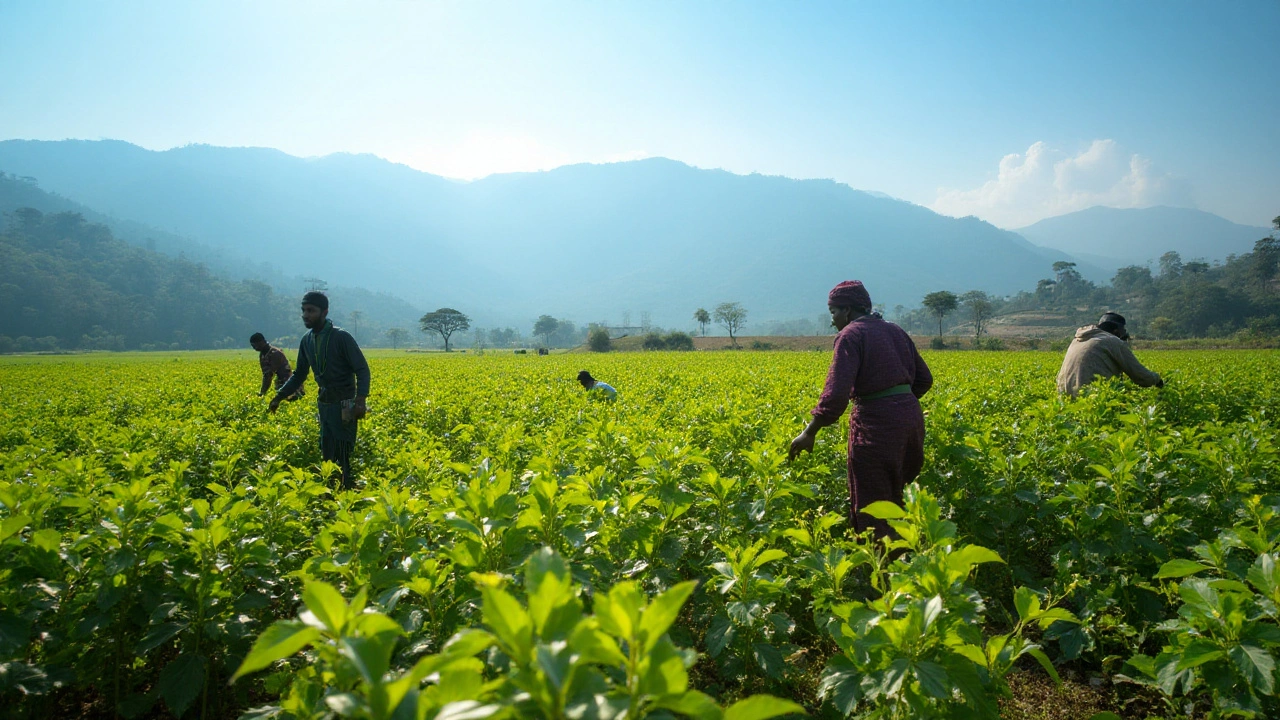
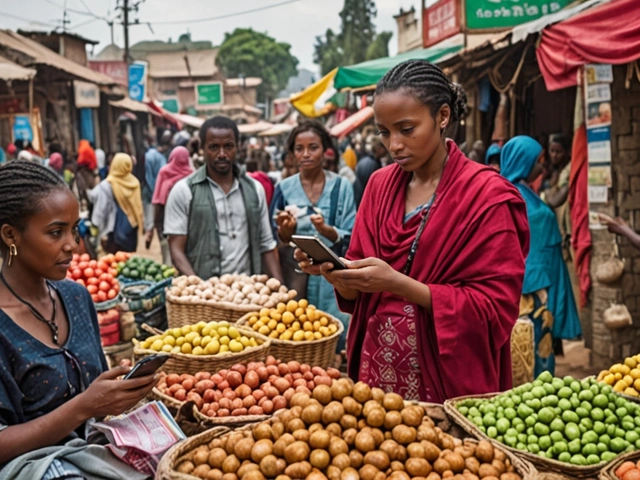 Exploring the Effectiveness of Mobile Money in Ethiopia
Exploring the Effectiveness of Mobile Money in Ethiopia
 Exploring Professions in the Bible: Ancient Jobs and Roles
Exploring Professions in the Bible: Ancient Jobs and Roles
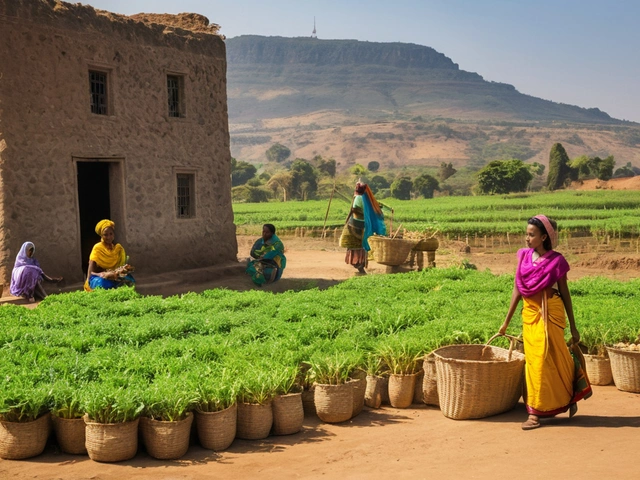 Ethiopian Jobs: Exploring Livelihoods in Ethiopia
Ethiopian Jobs: Exploring Livelihoods in Ethiopia
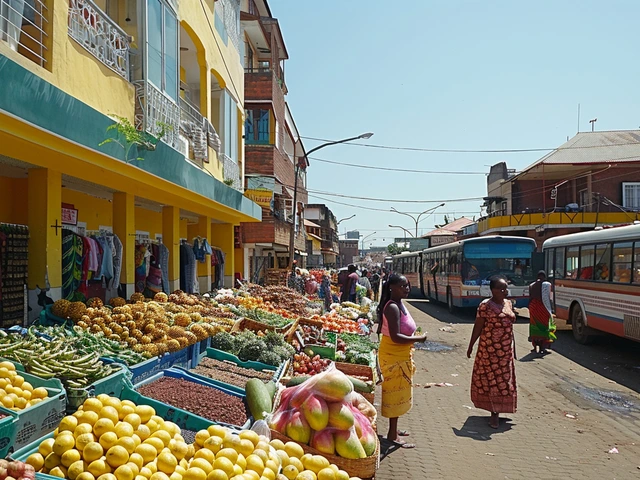 Cost of Living: How Much Money You Need for a Comfortable Life in Ethiopia
Cost of Living: How Much Money You Need for a Comfortable Life in Ethiopia
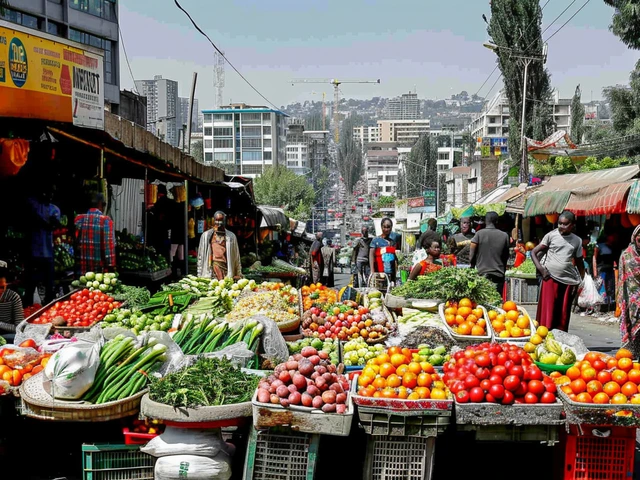 Is Ethiopia One of the Poorest Countries in Africa? Exploring Economic Realities
Is Ethiopia One of the Poorest Countries in Africa? Exploring Economic Realities
Horace Wormely
August 27, 2024 AT 17:36The article’s claim that roughly 70 % of Ethiopians work in agriculture aligns with the latest World Bank labor statistics, which place the share at 68.9 % for 2022. This proportion underscores agriculture’s dominance in the national economy.
christine mae cotejo
September 8, 2024 AT 19:20The tapestry of Ethiopia’s labor market unfolds like a dramatic epic, where each sector plays a distinct yet interwoven role in the nation’s destiny. While the numbers proudly tout agriculture’s 70 % share, the human stories behind those figures pulse with resilience, innovation, and relentless hope. Imagine a farmer in the highlands coaxing teff from the soil, his hands weathered yet steady, every sunrise a promise of nourishment for his family and the nation. Meanwhile, in the bustling streets of Addis Ababa, a young woman weaves intricate patterns into a textile, her deft fingers symbolizing the burgeoning manufacturing renaissance. The construction crews raising concrete towers echo the country’s rapid urbanization, each brick a testament to ambition and collective effort. Even the quiet cafés where baristas steam espresso embody the slow but steady rise of the service sector, offering new avenues for graduates hungry for modern careers. Mining engineers, perched atop the volcanic plateaus, extract gleaming gold and rare minerals, feeding not only export tables but also the dreams of communities yearning for prosperity. Tourism guides, with their animated tales of rock‑hewn churches, invite the world to witness Ethiopia’s ancient splendor, turning heritage into livelihoods. Yet, behind this vibrant mosaic lie challenges that demand urgent attention: climate volatility threatening crops, insufficient mechanization on farms, and wage gaps that still linger. The government’s investment in irrigation and extension services marks a positive stride, but scaling these initiatives will require sustained partnership with NGOs and the private sector. Women, who already shoulder a disproportionate share of unpaid labor, are beginning to claim seats at cooperative tables, their voices reshaping policy discussions and resource allocation. Education and vocational training programs, when aligned with market demands, can transform the youth’s potential into tangible productivity across all sectors. In this narrative, diversification is not a buzzword but a lifeline, reducing reliance on a single sector and insulating the economy from external shocks. As Ethiopia strides toward industrial parks and digital hubs, the job landscape will inevitably evolve, demanding new skills, adaptability, and a forward‑thinking mindset. Ultimately, the story of Ethiopia’s most common jobs is a saga of perseverance, where every worker-whether sowing seeds or coding software-contributes a verse to the nation’s unfolding anthem. Let us celebrate this collective endeavor while remaining vigilant, for progress thrives when optimism is paired with concrete action.
Douglas Gnesda
September 20, 2024 AT 21:03The diversification of Ethiopia’s labor force is a classic case of shifting the country’s economic value chain from primary agriculture to secondary and tertiary services. By integrating agro‑processing facilities, the nation captures more upstream value, turning raw coffee beans into premium roasted products that command higher export prices. Simultaneously, the rise of industrial parks injects advanced manufacturing capabilities, fostering skill transfer and raising the average human capital index. However, the transition is not frictionless; bottlenecks in logistics, limited access to financing, and regulatory lag can stymie growth trajectories. Policymakers should therefore prioritize interoperability frameworks that streamline permits and incentivize private‑sector R&D investments. In short, a balanced portfolio of agriculture, manufacturing, and services will enhance GDP resilience and broaden employment opportunities across urban and rural spectra.
Abhijit Pimpale
October 2, 2024 AT 22:46The persistent gender wage gap in Ethiopia’s informal sector remains an unsolved equity issue.
Eric DE FONDAUMIERE
October 15, 2024 AT 00:30Hey folks, let’s give a big shout‑out to all the Ethiopian farmers who keep the world fed – you’re absolutely killin’ it! The government’s new irrigation scheme is definetly a game‑changer, and with a little extra support, tehy can boost yields by double digits. Keep pushing, stay resilient, and remember that every seed you plant is a step toward a brighter future!
Pauline Herrin
October 27, 2024 AT 02:13While the overview admirably enumerates Ethiopia’s predominant occupations, it falls short of a rigorous analysis of labor market inefficiencies. The omission of quantitative metrics concerning wage disparities and occupational safety standards undermines the piece’s scholarly credibility.